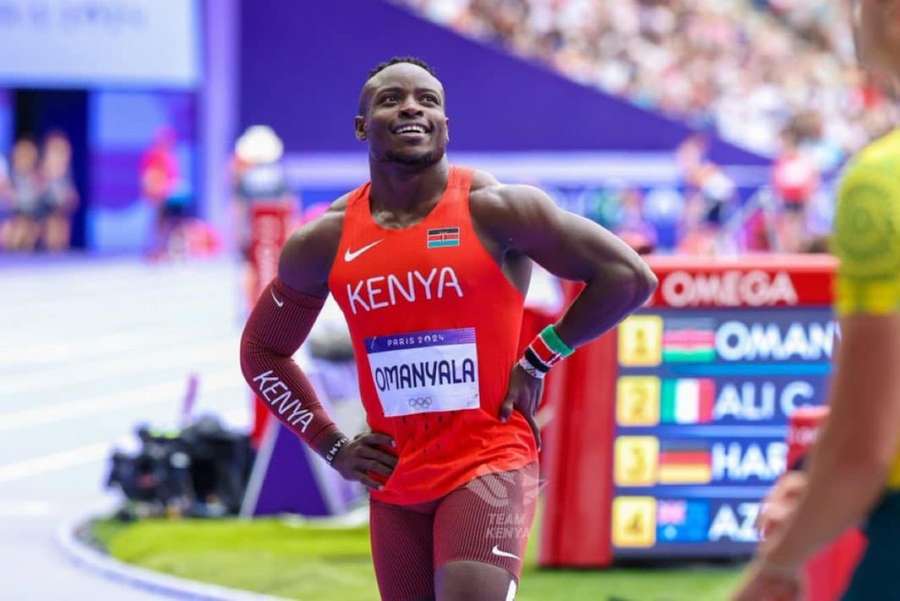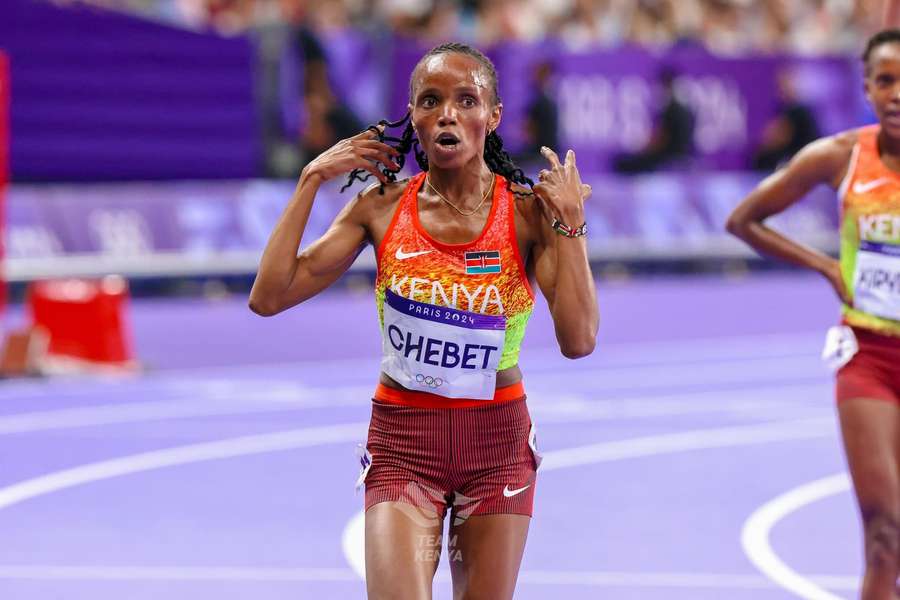Team Kenya’s performance at Olympics bitter pill to swallow admits Sally Bolo

On July 1st, at State House in Nairobi, Kenyan President William Samoei Ruto bid farewell to the team made up of athletics, fencing, judo, men’s rugby sevens national team Shujaa, women’s volleyball, and swimming.
However, as of Monday, August 6th, Team Kenya had only managed three medals – gold won by Beatrice Chebet in the 5,000m, silver won by Faith Kipyegon in the 5,000m, and bronze scooped by Mary Moraa, who finished third in the 800m race.
Kenya’s poor show in Paris started with Shujaa, who finished ninth overall after losing all their Pool B matches – a 31-12 defeat to Olympic bronze medalists Argentina, followed by a 21-7 defeat to Australia before winding up their preliminary matches with a 26-0 loss to Samoa.
Fencer Alexandra Ndolo (37) bowed out after a heartbreaking 13-12 defeat against Ukrainian Olena Kryvystka while sole judo representative Zeddy Cherotich (34) saw her journey end before even starting after losing her first match in the women’s Under 78kg category within the opening 43 seconds.
Kenya’s hopes for the first medal further went up in smoke after Uganda’s Joshua Cheptegei won gold in the 10,000m race. In the same race, Ethiopian Berihu Aregawi clinched the silver medal, while Grant Fisher from the United States bagged bronze.
Kenya’s best-placed athlete was Benard Kibet, who came home fifth after clocking 26.43.98 while Daniel Mateiko and Nicholas Kimeli finished 11th and 14th respectively. Another medal hope Ferdinard Omanyala, Africa's fastest man in 100m, fell by the wayside after finishing ninth and failed to qualify for the final.
Kenya’s dominance in athletics is slipping away
According to Sports Administrator Sally Bolo, Team Kenya’s display at the Paris Games, is causing a lot of concern, especially in athletics, where they have been giants not only in Africa but across the continent.
“As a proud Kenyan, I find myself deeply concerned about the decline in our athletic performance. Our once dominant position in the world of running seems to be slipping, and it’s hard not to wonder where things went wrong. I have been thinking a lot about this, and I believe several key issues have contributed to this worrying trend,” Bolo, a former official of FKF Premier League side Gor Mahia, told Flashscore.
Bolo believes opening Kenya’s training spaces to foreign athletes has hugely contributed to the poor performances being displayed by Kenyan athletes because most of those foreign runners use the opportunity to spy on “our very own".
“One major factor is the opening of our high-altitude training spaces, like those in Iten, to foreign athletes. These training grounds were once our well-guarded secrets, the breeding ground for our champions, but now, it feels like we have handed over the keys to our kingdom,” added Bolo.
“Foreign runners and their trainers come in, learn our techniques, and possibly even spy on us. It’s not far-fetched to think that these foreign managers who manage our athletes are not entirely pleased when Kenya defeats their home countries. By allowing this influx, we might have lost a crucial part of what made us unbeatable.”

Kenya first participated in the Olympic Games in 1956 and has sent athletes to compete in every Summer Olympic Games since then, except for the boycotted 1976 and 1980 Games. Kenya participated in the Winter Olympic Games in 1998, 2002, 2006 and 2018. Kenyan athletes have won 113 medals in total, all from boxing and track and field events, making them the most successful African committee at the Olympics.
In terms of total medals won, the most recent Summer Olympics (2008, 2012, and 2016) have been Kenya’s most successful, producing 42 medals between them.
At the 2008 Games in Beijing, Kenya came home with a total of 16 medals and finished 13th overall on the table. They bagged six gold, four silver, and six bronze medals. Heading to London for the 2012 Games, Kenya hauled 13 medals, two gold, four silver, and seven bronze while in 2016 Rio de Janeiro, they bagged 13 medals, six gold, six silver, and one bronze.
At the 2020 Tokyo Olympics, where they finished 19th overall, Kenya sent 85 athletes and returned home with 10 medals, four gold, four silver, and two bronze.
The selection process of athletes has also raised questions
While Kenya have a chance to add to their medals in Paris, but may not be able to reach what they achieved in Tokyo, Bolo argued that the selection of Kenya’s squad was one problem that needed an urgent solution for future assignments.
For example, in the 10,000m men’s race where Kenya missed out on a medal, favourite Daniel Ebenyo was not able to make the Team Kenya squad for Paris after encountering visa issues.
Kenya’s trials for the 10,000m were held at the Prefontaine Classic, the Eugene Diamond League, in Oregon in May, and Ebenyo arrived late owing to a visa delay and tripped and fell during the race, ending up eighth, when only the first two across the line earned direct tickets.
Despite assurance by Athletics Kenya (AK) that he could be considered, he was forced to watch the final from his sofa. “My expectations were to feature at the Olympics and everything was okay until the last minute when there were lots of issues,” Ebenyo said as quoted by INEWS.
“From visa hitches, arriving at the trials late and I did not have enough time to recover. I arrived in the evening and the trials took place the following day.”
Bolo believes such issues should have been avoided heading into a major competition by saying: “The selection process of our athletes raises many questions.”
Bolo continued: “When I compare today’s athletes to the legends of the past, there’s a noticeable difference. It seems we have strayed from focusing on food science and other critical aspects that once gave our athletes a competitive edge. The stature and form of our runners aren’t what they used to be, and this might reflect deeper issues in our training and preparation methods.
“Another concern is the sheer number of races our athletes participate in where money is involved. We see our runners consistently winning marathons and other races around the world, often sweeping the top positions. Yet, when it comes to the Olympics or Commonwealth Games, the results are disappointing.
“Why can’t this success in commercial races translate to the biggest stages? Perhaps it’s because our athletes are spread too thin, prioritising financial gain over peak performance at major events.”
Bolo warned unless something urgent is done to reverse the trend, Kenya’s athletics legacy is fading away at a very fast speed. “It’s heartbreaking to see Kenya’s proud athletic legacy fading. We need to reclaim our rightful place at the top, and that means making some tough decisions.
“We should consider tightening access to our training facilities, scrutinising the influence of foreign management, and refining our athlete selection and preparation processes. Our athletes need to be in peak condition for the most prestigious competitions, not just the ones with lucrative payouts.”
“Kenya’s history in athletics is a source of immense national pride. Watching our stars struggle is a bitter pill to swallow, but it’s not too late to turn things around. We must reignite the flame that once burned so brightly in Kenyan athletics.”
Bolo concluded: “Athletics Kenya should reflect on what made us great, restructure our approach, and reclaim our place at the pinnacle of global sports. The world needs to remember the roar of Kenyan champions, and it’s our duty to ensure they do.”
Kenya are no longer a shining star in sports
On social media, Kenyans believe the performance in Paris had enlightened the fact Kenya was no longer a force in sports. “Kenya is no longer a shining star in all sports as far as athletics and football is concerned,” said Silas Odero.
“From football to athletics we have experienced dwindling results in both fields and I can attribute this to the current generation in our country, unlike the previous generation where hard work and discipline were the only keys to success, the latter is subscribed to a theory of a soft life and work smarter.
“I think this is the criteria being used during recruitment of our athletes in Kenya thus denying a chance to the best and most qualified athletes while rewarding the least performers, who are well connected to who knows who in the government.”
Physio Moturi Anyona wrote: “Where we first started losing is allowing athletics training camps to be accessed by foreign managers and athletes as well as foreign medics, who collude with their dirty tricks including sneaking prohibited substances to our athletes.
“Also, these foreign managers come as spies for their countries, training camps should forthwith be highly guarded like the ones for Ethiopia.”

